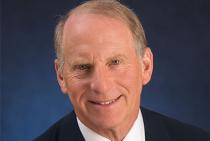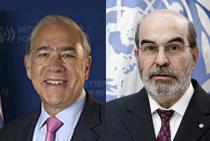One of the biggest obstacles to reducing the rate of unplanned pregnancies is the lack of sex education in schools. If more teenagers had access to sex education and contraception, fewer girls would have their lives interrupted by pregnancy. Only by empowering women and girls with the resources to control their reproduction will the grim statistics that have long burdened Guyana – and many other countries – begin to change for the better. By Patricee Douglas
You are here
Results for Opinion
Friday 18 January 2019
Georgetown, Guyana
Monday 14 January 2019
New York, USA
In a world divided by conflict and greed, the Global Fund’s fight against AIDS, tuberculosis, and malaria is a matter of enlightened self-interest and a reminder of how much humanity can accomplish when we cooperate to save lives. For public and private donors, that means providing the financing needed to eliminate all three scourges by 2030.
Thursday 3 January 2019
1 comment
Nuku'alofa, Tonga
We can all agree that a free press reporting the news without political control is one of the important pillars of a democratic society. Take this away and democracy will erode into dictatorship. It is also the first line of defense against government corruption and tyranny. – ‘Ana Tausinga.
Wednesday 2 January 2019
New Delhi, India
America’s decision to abandon the global system it helped build, and then preserve for more than seven decades, marks a turning point, because others lack either the interest or the means to sustain it. The result will be a world that is less free, less prosperous, and less peaceful, for Americans and others alike. By Richard N. Haass.
Friday 28 December 2018
New York, USA
This month’s United Nations Climate Change Conference (COP24) in Katowice, Poland succeeded in producing a rulebook to implement the 2015 Paris climate agreement. Every UN member state signed on. But that will not be enough to head off climate catastrophe. It’s time to call in the engineers. When heads of state convene at the UN next September, the world’s leading engineers should greet them with a cutting-edge framework for global action. Energy transformation for climate safety is our twenty-first-century moonshot. By Jeffrey D. Sachs.
Thursday 27 December 2018
London, United Kingdom
Seven decades after its adoption, the Universal Declaration of Human Rights (UDHR) remains a beacon of hope for the world, sending out an unequivocal message that an injustice anywhere is a threat to justice everywhere, and that no abuse of human rights can be allowed to continue without challenge. But despite major advances over the last seven decades – such as the creation of the International Criminal Court (ICC) and the UN’s Responsibility to Protect doctrine – human-rights abuses continue to be perpetrated at an alarming rate and with virtual impunity. By Gordon Brown.
Thursday 6 December 2018
Geneva, Switzerland
Each year, some 700,000 people die from drug-resistant infections worldwide. But superbugs also pose a threat to the effectiveness of modern medicine; if left unaddressed, antimicrobial resistance (AMR) could make more infections untreatable, cancer therapies ineffective, routine surgeries impossible, and even childbirth unsafe. By Seth Berkley and Jeremy Farrar
Thursday 6 December 2018
Sydney, Australia
The establishment of renminbi-based oil trading at a time when China and many other economies confront aggressive US tariffs, and possible further development of renminbi-based trade in other commodity markets, suggests that the US dollar could face an unprecedented challenge to its hegemony. It may in the near future no longer be seen as the anchor of the international monetary system, bringing to an end to what Valéry Giscard d’Estaing famously called the “exorbitant privilege” enjoyed by the US as a result of the dollar’s centrality in international trade. By John A. Mathews and Mark Selden.
Monday 26 November 2018
Nuku'alofa, Tonga
Prime Minister Pohiva has been an oppositional leader in Tonga's government since 1987...now that he is the Prime Minister and head of government, he still continues with the same mindset of governing in opposition, undermining his very own government. He opposes the majority of Tongans who decry his outrageous disregard for following policies, procedures, and the law. Simply put, PM Pohiva does not practice what he once preached passionately: democracy. - 'Ana Tausinga.
Tuesday 20 November 2018
Washington DC, USA
The Juliana v United States trial is about more than the environment; it will have far-reaching implications for intergenerational justice more broadly. Consider the issue of public debt. There have always been moral objections to one generation burdening the next with excessive debt, effectively limiting young people’s future liberty by impinging on their ability to form families, educate children, and create wealth. By Robert Dugger.
Tuesday 20 November 2018
Paris, France
Eradicating hunger, ending food insecurity, and ensuring sustainability are global priorities that call for collective action. We need to strengthen, not weaken, international cooperation. The international community needs to do three things to harness the benefits of trade in food and agriculture products. By Angel Gurría and José Graziano da Silva
Tuesday 13 November 2018
Sene, 'Aositelelia
Kau Fale Alea, ko ho’omou tali e lipooti ‘a e ‘atita ‘oku tatau ia mo ha’amou pehee ‘oku mo’oni e lipooti ‘a e ‘Atita, ka ki he Kapineti mo e PM ke hoko atu pe ‘enau ngaue ta’e Faka-lao mo Ta’e-Faka-Konisitutone ka tau toki sio he ta’u fo’ou ki he palopalema ‘a e fonua. – ‘Inoke Fotu Hu’akau.
Tuesday 13 November 2018
Tokyo, Japan
On his week-long tour of Asia, US Vice President Mike Pence has been promoting a vision of a “free and open” Indo-Pacific region, characterized by unimpeded trade flows, freedom of navigation, and respect for the rule of law, national sovereignty, and existing frontiers. The question is whether this vision of an Indo-Pacific free of “authoritarianism and aggression” is achievable. One country that seems willing to contribute to realizing this vision is Japan. By Brahma Chellaney
Tuesday 13 November 2018
Princeton, USA
The murder of Jamal Khashoggi in Saudi Arabia’s Istanbul consulate on October 2 has focused attention on the Saudi regime. And yet the strong response to Khashoggi’s brutal murder stands in stark contrast to the relative indifference the West has shown to the vastly larger number of victims of the Saudi-led military intervention in Yemen. Saudi airstrikes have killed thousands of civilians, including children who died when school buses were bombed. Now those deaths are themselves heavily outnumbered by the toll of the widespread famine engulfing Yemen “much bigger than anything any professional in this field has seen”. By Peter Singer.
Wednesday 7 November 2018
Sydney, Australia
Tonga is getting from worse to worst-ever performance by a government led by its Prime Minister. -‘Inoke Fotu Hu’akau.
Tuesday 30 October 2018
4 comments
Sydney, Australia
This kind of behaviour by the Prime Minister and his Cabinet members is no laughing matter any more, they are pussyfooting around with the most dangerous situation our nation ever experienced in the last 100 or so years. - 'Inoke Fotu Hu'akau.
Friday 19 October 2018
Geneva, Switzerland
Unfortunately, few agricultural workers are in a position to advocate for their rights. Seasonal and rural workers lack access to collective bargaining, and undocumented migrant workers avoid unions for fear that employers will retaliate by calling the immigration authorities. Moreover, basic benefits such as social security, health care, and workers’ compensation are typically nonexistent. By Hilal Elver and Melissa Shapiro
Thursday 18 October 2018
 Premium content
Premium content
Stockholm, Sweden
As scientists have conclusively shown, in the last decade, we have entered a new geological epoch, the Anthropocene, in which human activity – in particular, economic activity – has been the dominant factor influencing Earth’s climate and environment. In the Anthropocene, our planet’s life-support system is changing faster than ever. By Johan Rockström, Jørgen Randers, and Per Espen Stoknes
Tuesday 16 October 2018
Amman, Jordan
Arab countries have a long history of rewarding journalists who toe the official line, while punishing those, like Khashoggi, who dare to speak truth to power. Such behavior is not limited to dictatorships. It does not help that many of those press-freedom violators – including Saudi Arabia – are among America’s closest allies. President Donald Trump’s attacks on the US press, together with his silence on attacks occurring elsewhere, have gone a long way to embolden violators of press freedom around the world. By Daoud Kuttab
Tuesday 9 October 2018
San Jose, USA
The Intergovernmental Panel on Climate Change (IPCC), the United Nations body tasked with providing scientific evidence and consensus on climate change and its implications for decision-makers and the public, has just issued its latest, long-awaited report. The challenge it presents to all of us is huge. By Monica Araya and Carlos Manuel Rodriguez

















